Dagbani Proverbs: A Comprehensive Collection of 400+ Dagomba Proverbs and Meanings
Dagbani proverbs are a rich and vibrant part of the cultural heritage of the Dagbani people, an ethnic group predominantly residing in the Northern Region of Ghana. These proverbs passed down through generations, encapsulate the collective wisdom, values, and moral teachings of the Dagbani community. They offer insightful glimpses into the worldview, traditions, and social norms of the Dagbani people. In this article, we will explore the history, characteristics, significance, and impact of Dagbani proverbs.
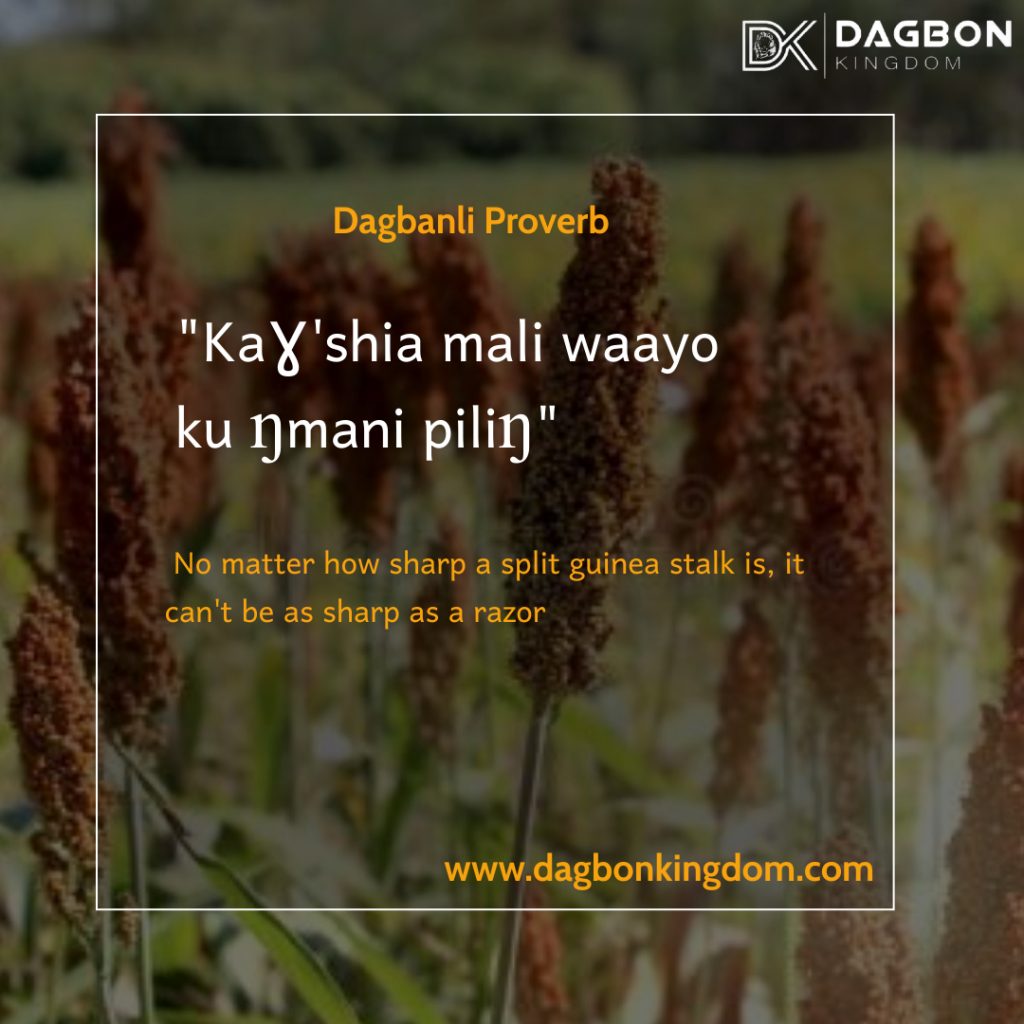
Dagbani Names: 200+ Beautiful Dagbani Names and the Joyous Naming Ceremony Among Dagomba
History and Cultural Significance
Dagbani proverbs have a long and storied history that dates back centuries. Originating from the Dagomba Kingdom, these proverbs have been an integral part of the cultural fabric of the Dagbani people. They were used by elders and community leaders as a means of communication, imparting wisdom, and resolving conflicts.
The significance of Dagbani proverbs lies in their ability to convey complex messages in a concise and memorable manner. They serve as cultural markers, embodying the collective knowledge and experiences of the Dagbani community. Proverbs were often recited during important ceremonies, rituals, and gatherings, reinforcing the values and beliefs of the community.
Characteristics of Dagbani Proverbs
Dagbani proverbs are characterized by their conciseness, expressiveness, and clever use of metaphorical and figurative language. These qualities make them both memorable and impactful. They often employ imagery drawn from everyday life, nature, and the animal kingdom, effectively conveying deep insights and moral lessons.
One remarkable aspect of Dagbani proverbs is their ability to reflect the social norms and values of the Dagbani people. They provide guidance on proper behavior, respect for elders, the importance of community, and the value of hard work and perseverance. Through these proverbs, the Dagbani community upholds its traditions and imparts valuable lessons to younger generations.
Moliyili: Exploring the Golden Era Of Dagbon Kingdom: The Impact of Moliyili Scholars and Its Fall
Lessons and Wisdom in Dagbani Proverbs
Dagbani proverbs offer valuable lessons and wisdom that extend beyond the Dagbani community. They touch on universal themes such as honesty, perseverance, respect, and humility. These proverbs provide moral and ethical guidance, helping individuals navigate life’s challenges and make informed decisions.
Furthermore, Dagbani proverbs offer practical advice for various aspects of daily life. They address topics like relationships, family dynamics, agriculture, and community engagement. By encapsulating valuable insights in a concise and memorable format, these proverbs facilitate effective communication and contribute to the preservation of cultural values.
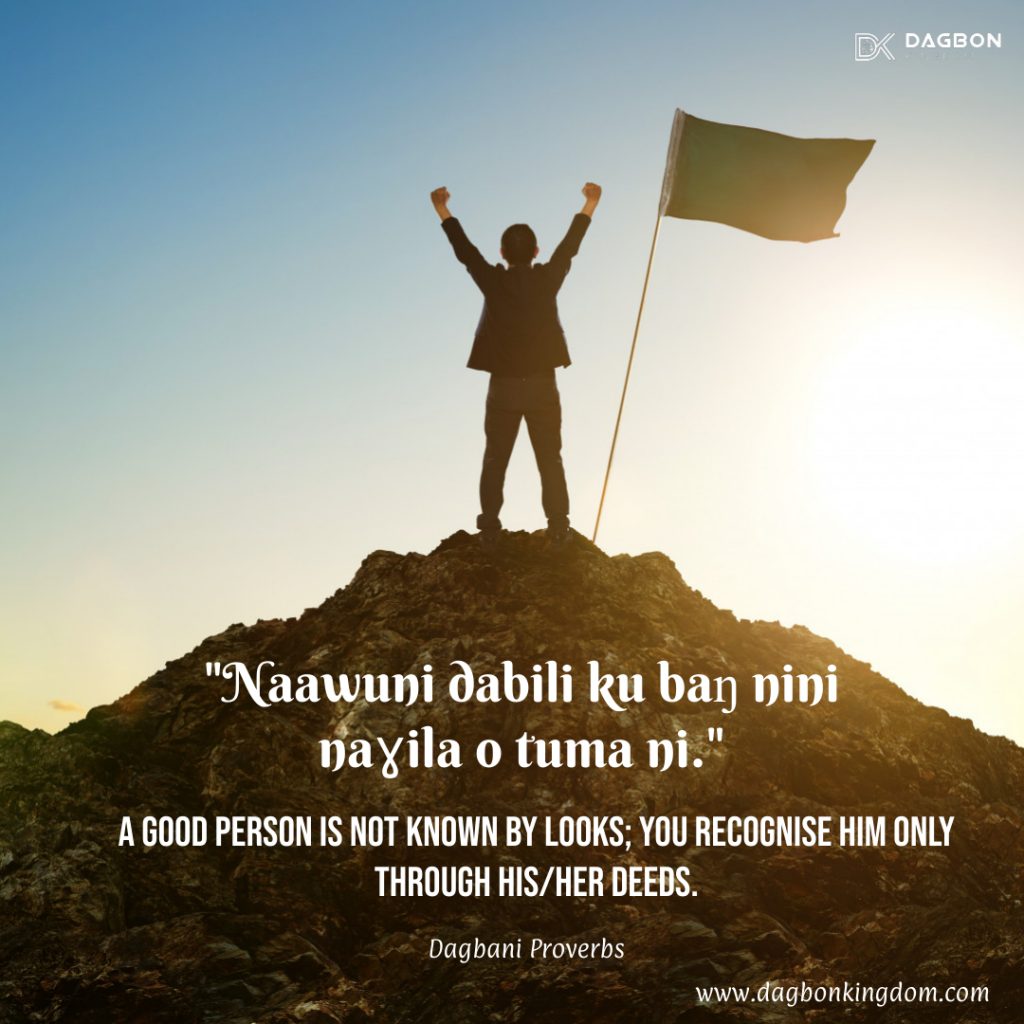
Preservation and Transmission
Dagbani proverbs have traditionally been transmitted through oral tradition, passed down from elders to younger generations. This mode of transmission ensures the preservation of the language, culture, and wisdom embedded in these proverbs. However, with modernization and globalization, the oral tradition faces challenges.
To mitigate the risk of losing this invaluable cultural heritage, efforts are being made to document and revitalize Dagbani proverbs. Researchers, linguists, and community organizations are working together to compile collections of proverbs and make them accessible through written materials, audio recordings, and digital platforms. These initiatives aim to ensure the continued appreciation and understanding of Dagbani proverbs by future generations.
History Of Mole Dagbon: The History Of Mole Dagbon State
Influence on Art, Literature, and Education
Dagbani proverbs have found their way into various forms of art, literature, and education. In literature, they are incorporated into stories, poems, and plays, adding depth and cultural authenticity to the narratives. These proverbs enrich the storytelling experience and allow readers to connect with the cultural heritage of the Dagbani people.
In the educational realm, Dagbani proverbs are used as pedagogical tools to teach language, cultural values, and critical thinking. They promote linguistic proficiency and cultural identity among Dagbani-speaking students. Additionally, non-Dagbani speakers can also benefit from learning about Dagbani proverbs, gaining insights into a different culture and broadening their perspective.
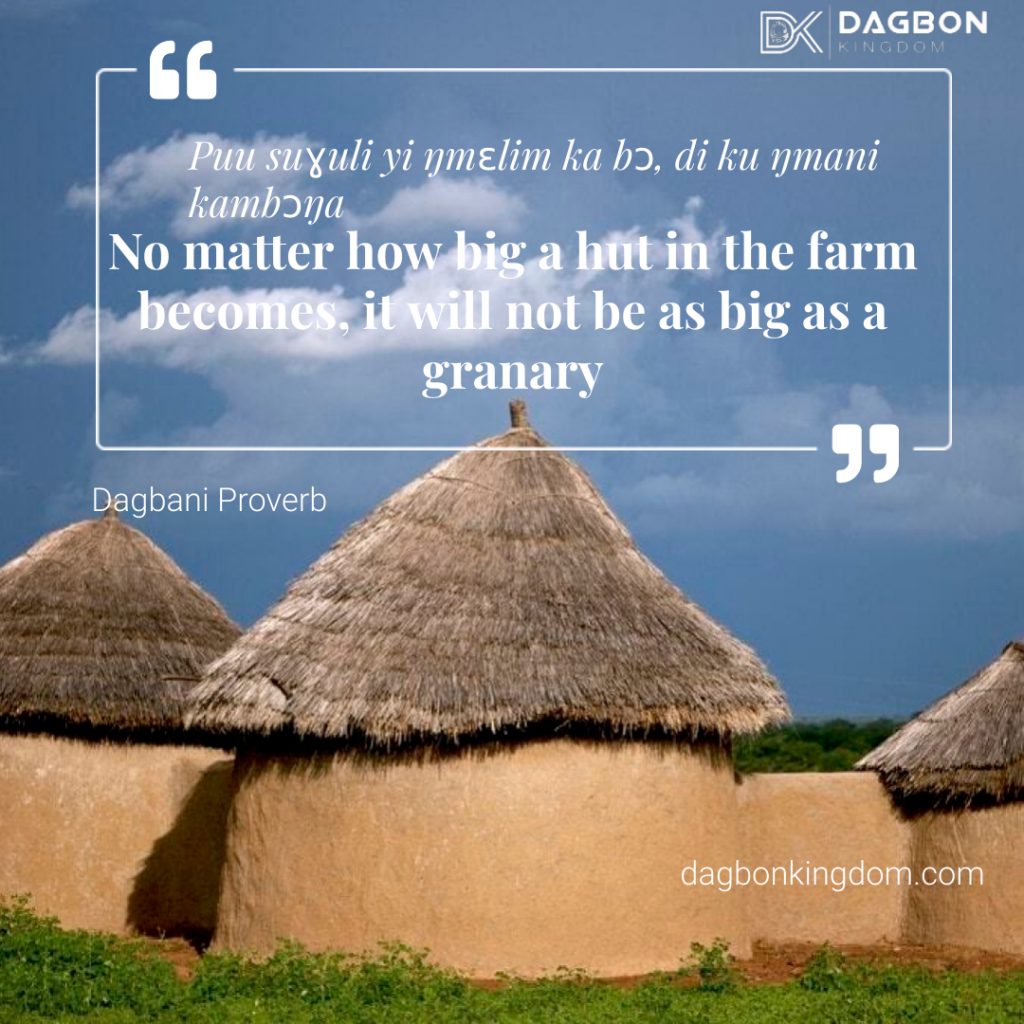
Naa Zangina: History Part 1: Naa Zanjina and the creation of the three gate skins
Types of Dagabni Proverbs
Dagbani proverbs encompass a wide range of themes and subjects, reflecting the cultural values, traditions, and experiences of the Dagomba people. These proverbs serve as concise and memorable expressions of wisdom, offering insights and guidance in various aspects of life. Here are some of the types of Dagbani proverbs: maligu, paɣa pini, saɣisigu, karimbaani, binkɔbiri, kum, tarim, zunyuŋ, ʒiri, fara, Naawuni, suɣilo, dabiɛm
In Dagbon, there are proverbs that mention specific towns and places (Tiŋsi ŋaha), while others offer general wisdom about life (Biɛhigu ŋaha). Many of these proverbs can be traced back to the sayings of chiefs in Dagbon and significant events that occurred during their reigns.
Proverbs such as “ŋuni n nam kuli?” (What did the bird eat?), “Aburu kaleem luwa” (The innocent one has escaped), and “Somoa bɛ zɔri ka chɛri o ba dabɔɣu” (You cannot seize someone’s leg and say it is a drumstick) have their origins in important historical events.
These wise sayings continue to be widely used today and are often employed by the lunsi (traditional praise singers) to extol the virtues of chiefs and their descendants. In Dagbon, these proverbs are known as Nanim yu’pirisi or Nanim salima.
Regardless of their origins, proverbs remain an essential means for wise individuals to convey their messages in Dagbon society. They serve as a vehicle through which wisdom is effectively communicated and passed down to future generations.
Dagbon Hats: The Traditional Dagbon Hats: Types, How It’s Worn And It’s Significance In Dagbon Kingdom
Dagomba Proverbs with Names of Towns
In Dagbon culture, proverbs often incorporate the names of towns and places to convey specific meanings and provide context. These proverbs offer insights into local history, events, or characteristics associated with particular locations within the Dagomba community. By using the names of towns, these proverbs create a deeper connection with the people and places they reference, enriching the cultural significance of the message conveyed.
The inclusion of town names in Dagomba proverbs serves as a way to preserve local heritage, pass down historical knowledge, and emphasize the importance of specific places in the community. These proverbs reflect the close relationship between language, culture, and geography in Dagbon society, highlighting the interconnectedness of people and their surroundings. Through these proverbs, the wisdom and traditions of the Dagomba people are intertwined with the unique characteristics and experiences associated with different towns and places.
- Ka zaa n kuni kumbuŋ n ti ŋmani kumbuŋnima
- Kari-Naa kikaa, a yi kuli piɛbi a ni bori shɛm, bɛ yɛn piɛbila a ni jɛ shɛm.
- Zanduli ka chandi, Bagbani ka labiga.
- Yɔɣu bia n dooi baŋa, ka di biɛri yɔɣunima. ŋun gba bora ŋun dooi.
- ŋun chaŋ Savelugu wum o zilima ni labi zɔɣu.
- Tuɣulan Damba, kpaakpuliŋ!
- Bɛ yɛliya ni Tamale pala tiŋa. Ti kuli ʒimi ka yi kana. Ti kuli lahi yɛn ʒimi ka yi kuli.
- Gbalonim baamaya, biɛɣuni sa lan kani?
- Nyinbun-Naa baa yuli- soya wɔliya.
- Pishiɣu-nim baamaaya, sirigi lu tandɔɣu ni

Dagbani Proverbs of Patience – Suɣulo ŋaha
Patience is a virtue highly valued in Dagbon culture, and there are several proverbs in the Dagbani language that emphasize the importance of patience. These proverbs provide insights into the significance of patience in various aspects of life and offer guidance on how to cultivate this quality.
1. “Suɣulolan n diri o ba yuli.”
Meaning: Only the one with patience inherits his father’s name.
This proverb emphasizes the value of patience in achieving long-term success and recognition. It suggests that those who demonstrate patience in their actions and endeavors are more likely to leave a lasting legacy and be remembered for their accomplishments.
2. “Suɣulo yi beni chinchini ni kpe gaɣali ni.”
Meaning: It’s with patience that you can put a cloth into a gallon.
This proverb highlights the importance of patience in achieving difficult tasks or goals. Just as it requires patience and careful maneuvering to fit a cloth into a small opening, it suggests that patience is necessary to overcome challenges and accomplish seemingly impossible feats.
3. “Suɣulo zuɣu ka dakoli nya paɣa, ka paɣ’lan nya bia.”
Meaning: It’s only with patience that a bachelor gets a wife and a woman gives birth.
This proverb emphasizes the role of patience in significant life events, such as finding a spouse and starting a family. It suggests that patience is necessary in building relationships and waiting for the right timing for important milestones to occur.
4. “Suɣulo mali nyɔri, suli n ka shɛli.”
Meaning: Patience comes with benefits, while impatience comes with nothing.
This proverb highlights the advantages of practicing patience in contrast to the negative outcomes associated with impatience. It suggests that being patient leads to positive results and rewards, while impatience often leads to disappointment or unfavorable consequences.
5. “A yi niŋ Suɣulo ka bi di nyɔri, a bi niŋmi paai.”
Meaning: If you don’t benefit from patience, then you weren’t patient enough.
This proverb emphasizes the idea that the full benefits of patience are only realized when one exhibits unwavering patience until the desired outcome is achieved. It suggests that true patience involves persevering until the rewards are obtained.
6. “Din chani yuŋ ka kari a yaanim ŋɔ, ka a dii che ka biɛɣu neei.”
Meaning: Walking in daylight is better than relying on ancestral protection while walking at night.
This proverb encourages individuals to prioritize taking actions in favorable conditions rather than relying solely on external support or luck. It suggests that it is more prudent to make decisions and pursue goals in a clear and visible manner, rather than relying on uncertain or supernatural assistance.
7. “Zolɔɣu ŋun bori yom, ŋun ka binkpaɣili marigira.”
Meaning: The fly that’s in a hurry is the one the toilet falls upon.
This proverb serves as a cautionary reminder against rushing or being impatient. It implies that acting hastily or without careful consideration can lead to undesirable consequences or being caught in unfavorable situations.
8. “Yiya yi baa kpirila kum.”
Meaning: A mad dog dies with hunger.
This proverb highlights the consequences of irrational or reckless behavior. It suggests that individuals who exhibit madness or irrationality often suffer negative outcomes, emphasizing the importance of rationality and sensible actions.Lu ka n lu m-maani bahi diɛma
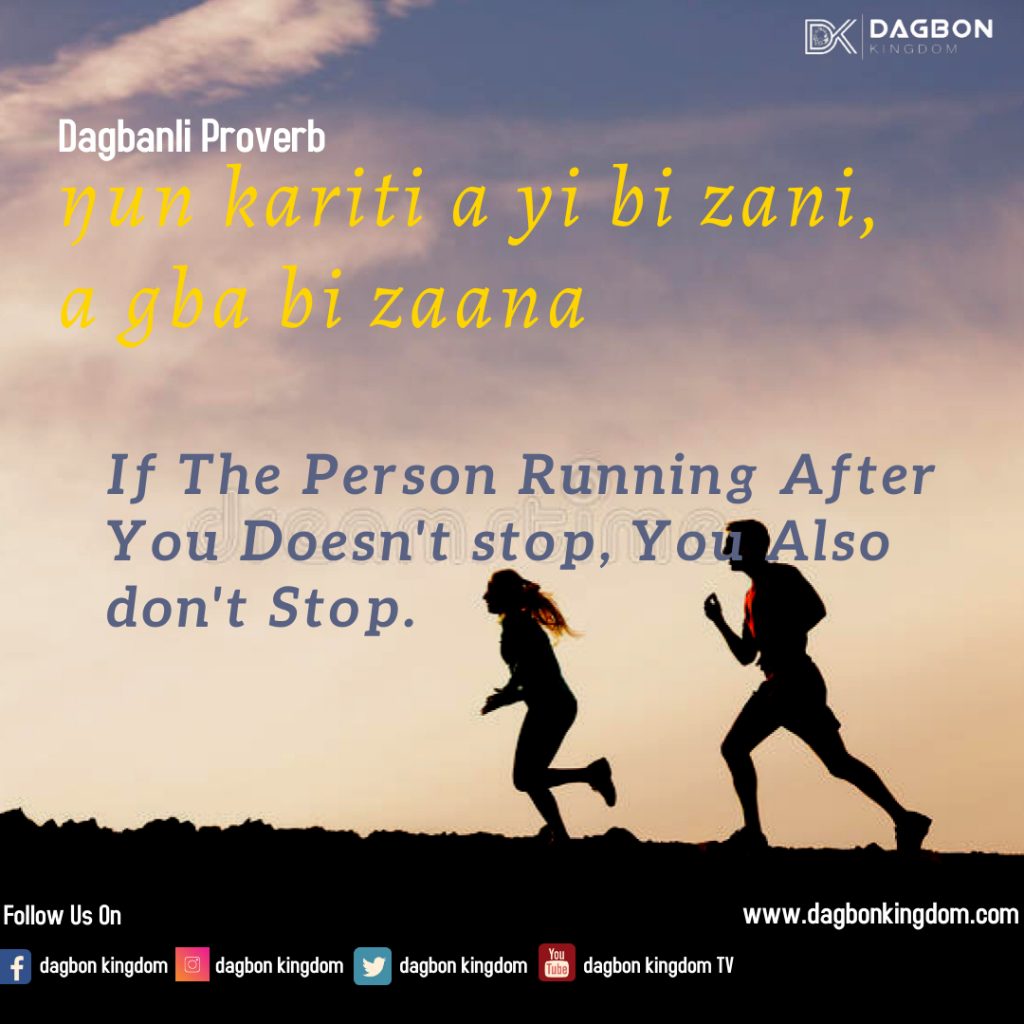
Dagbani Proverbs about Unity
In Dagbon culture, unity is highly regarded as a fundamental principle for communal progress and harmony. The Dagbani language has a rich collection of proverbs that emphasize the significance of unity and highlight its positive outcomes. These proverbs serve as reminders of the importance of coming together, working as a collective, and embracing solidarity for the betterment of the community.
- Nubil yini ku pii kuɣili – One finger can’t pick up a stone
- Din tuli zuɣu ka Naawuni nam kparima ayi. – because of hotness God created to cheeks
- Niri laɣirila jaŋ’ zori ni a doli ti pani tia zuɣu ka o paai ti a. –
- Din nam kamli, din n nam kamto.
- Bihi yi zabiri saɣim zuɣu, bahi n ti diri li.
- ŋun doli soli ka ŋuni n dari mɔɣu. Do zaa kunila Yaakuba yili.
- ŋun duɣi juɣu, ŋun n dɔɣi suliga ni tɔrili
- Din nam kamli, din n nam kamto
Dagbani Proverbs about Chastity
Chastity, the virtue of maintaining purity and moral integrity, holds great significance in Dagbon culture. The Dagbani language is rich with proverbs that emphasize the value and importance of chastity in various aspects of life. These proverbs provide insights into the cultural expectations surrounding relationships, morality, and personal conduct. They serve as a reminder of the virtues associated with maintaining chastity and the positive outcomes that stem from it.
- Bia ŋun nuu viɛla, ŋun n samdi kpɛm dɔri.
- Bia ŋun duri ti’suŋ, ŋun ka ninkura tabira.
- Gampiriga din mali mahim, din ka zɔna gɔnda.
- Soli din viɛla ni laɣim so’chandiba.
- Kuli noli din viɛla ni laɣim nyuriba
- Baa lan zuɣu ka bi shini baa
Dagbani Proverbs About Life
Life, with all its complexities and experiences, is a subject that Dagbon culture reflects upon through its rich collection of proverbs. These proverbs offer insights and wisdom about various aspects of life, providing guidance, observations, and reflections on human existence. They serve as a reminder of the lessons learned from past generations and offer practical wisdom for navigating the ups and downs of life.
- ŋun bɔri o vum, ŋun’ n chimdi o gabo.
- Lana piligu ka a yɛn baŋ ni di ni yi poli.
- Buɣim yi na bi di, sakɔri bi puhiri taba ni ti zuɣu suŋ
- Tarim barila o buŋa, ka o naba vuri tiŋa.
- Noonbil ŋun yuli ʒɛm o kpuŋkpaŋ, ŋun’ ka bihi shɛra.
- ŋun tum ka di bie, ŋun’ n gbili tibili.
- Lana piligu ka a yɛn baŋ ni din’ yi pɔli.
- Naɣ’so ŋun ka Zuli, Naawuni
- Dɔli ni yaari shɛm, ka lala ka ti ŋmɛra
Dagbani Proverbs About Knowledge and Wisdom
Knowledge and wisdom are highly esteemed in Dagbon culture, and the Dagbani language contains a wealth of proverbs that emphasize their importance. These proverbs reflect the deep-rooted belief that knowledge and wisdom are crucial for personal growth, decision-making, and navigating through life’s challenges. They serve as a reminder of the value placed on acquiring knowledge, seeking wisdom, and applying them in practical situations.
Conclusion
Dagbani proverbs are a treasure trove of wisdom, encapsulating the values, traditions, and moral teachings of the Dagbani community. Through their concise and expressive nature, these proverbs communicate profound insights and practical guidance for daily life. They reflect the cultural identity of the Dagbani people and continue to inspire and educate individuals both within and outside the community.
By recognizing the importance of Dagbani proverbs, supporting their preservation, and embracing their universal messages, we can foster intercultural understanding and appreciation. Let us delve into the world of Dagbani proverbs and discover the timeless wisdom they hold.
References : Wikipedia
450+ List of Dagbani Proverbs (Dagomba Proverbs) And Their Meaning
| Dagbani Proverbs, | Translation | Meaning |
|---|---|---|
| Puu suɣuli yi ŋmɛlim ka bɔ, di ku ŋmani kambɔŋa. | No matter how big a hut in the farm becomes, it will not be as big as a granary. | Don’t compare yourself to someone who is greater than you. It may also mean we shouldn’t compare ourselves to others who have something that we don’t have. You may also have something that person doesn’t have. |
| Ʒiri yirigi pum, ka yɛlimaŋli deei wali.” | Lies produce flowers, but it is the truth that gets the fruits. | The results of speaking the truth are always better than the results of telling lies. Or lies may carry you on your journey, but the one with truth will usually come and pass with more speed than yours. |
| Alizanda soli bili mɔri, wunti’zɔriba (wundabili) n-kani (n-naai)”. | If heaven’s path is grown over with grass, it means that there are no more good people around”. | If good people do not speak out against bad things, they will continue to happen. |
| Din nam kamli, dina n-nam kamtoo.” | What has created the ordinary garden egg has also created the bitter one. | Some people are good and some people are bad, but we are all descendants of the same ancestor. So we should learn to tolerate one another. This is often said to people during peace talks. |
| Gutulu ku sooŋa, n-tam wɔb’kura yɛla.” | An ungrateful man killed a hare and forgot about the elephant hunter. | The elephant hunter had given him much meat and he didn’t give anything in return. This is said to someone who you have helped a lot and he/she refuses you even a little help. |
| Jɛrigu ka yɛm shɛri dɔɣim, amaa o lee mali yɛm ŋmari dɔɣim” | The fool has no sense to unite a family, but he has sense to destroy a family”. | This is often said to someone who is using his talents to do evil to others instead of good; meanwhile evil has no reward but punishment from God. |
| Kaɣ’shia mali waayo ku ŋmani piliŋ.” | No matter how sharp a split guinea stalk is, it can’t be as sharp as a razor. | You may have some strengths, talents, intelligence, wisdom or whatever, but don’t think you can challenge everyone. This is said to someone who has been thinking he is the greatest in anything until he meets a bad day with someone greater than him/her. |
| Sataŋ kuɣili baɣa ni nɔŋ’kpani.” | The stone anvil doesn’t care about the scorpion’s spear.” | I don’t fear the bad deeds of an evil person; God is my protector. This is used in a situation where the speaker believes God has been his guard against his enemies’ evil, machinations, ploy, lies etc. |
| Dahinshɛli beni ka jɛŋkuno ni ŋubi sima ka guui kɔhi n-ti jɛngbariga.” | There will be a day when the cat will eat groundnuts and have some leftover to sell for the benefit of the mouse.” | With hope there will be a day two archrivals will unite. Unity is always possible if there is hope. It may also mean that we should have hope that God will always provide our needs. |
| Baŋdi waayo ku baŋ nu’ kpibili.” | Even if you are an expert in understanding everything, you can’t know what is inside a closed hand. | No one knows tomorrow. You can’t know exactly what is in the future. If there is an in-camera or closed door meeting of people you won’t know the outcome until they tell you. If the gods have something for you, you won’t know until it comes. |
| Tahima zuɣu ka juɣu doli gbuɣinli.” | The vulture follows the lion because of hope of getting something (carcass).” | The weak follows the strong because they hope to get something from them. When you respect somebody, it is because you hope to get greater benefit from him. |
| Tambiɛɣu din tabili kuɣili ni saɣim lɛri.” | A white ant hill that is built on a stone spoils an axe.” | We should beware of hidden dangers. Evil close to good may destroy the good. |
| Toya kum gari Alidu.” | The sound of several mortars pounding confused Alidu.” | A lot of things may come at the same time and need to be attended to at the same. If you have a small problem, solve it once and don’t wait to have several problems. It will confuse you like the sound from mortars pounding fufu confused Alidu. E.g. “Di chɛ ka toya ti kum gari Alidu”. That is “Don’t let the sound from several mortars pounding confuse Alidu.” |
| Ŋun karit’ a yi bɛ zani, a gba bɛ zanda.” | If the person running after you does not stop, you also don’t stop.” | Do not stop fleeing or defending yourself when there is still danger pursuing you. If your challenges are unresolved, you don’t stop struggling. |
| Pololi yi ʒi shɛli kam amaa o mi lɔŋ gballi.” | Even if the toad doesn’t know anything at all, at least it knows the grave of the frog.” | No matter how limited someone is, or how bad someone is, he or she has at least one good quality. |
| Wahu nyirivɔɣu m-bala.” | The is the anus of a horse.” | This is used to let the one boasting know that everyone knows that he won’t fulfill his promise. It may also refer to someone who wants to hide something that can’t be hidden. |
| Gaɣili deei mia, baŋmi nyaɣibu.” | The gourd has a rope tied round it; you have to know how to hang it on your shoulder.” | If you are given a position of authority, you need to learn how to act accordingly. If a couple gets married, they need to learn how to live together with each other. If you are in any situation, you have to learn how to live your life to suit that situation. |
| Dam is duu, yɛlli mii beni.” | There is pito in the room, there is also trouble inside.” | This proverb is said to have come from a story about a pito-drinking place where one day the pito seller was found dead inside the drinking spot (room). The pito buyer wanted the pito but there was trouble inside as the dead woman was there. This may be used as a warning that there is danger where you want to go. |
| Baŋkaŋ yihiri bɔ naɣilaa lan’ni?” | What can a tick remove from the bull’s testicle?” | If you have many things and only one is taken, you won’t feel it very much. It also means your enemies want to block your way to success but what they are doing cannot prevent your success if you have God in your favor or if what they are rather attacking is not your main source of success. |
| Dakoli ku sooŋa ku dooi bim.” | A bachelor hunter killed a rabbit, but he won’t get its broth.” | This proverb relates to a story of a bachelor hunter who killed a rabbit but could only give it to the wife of another hunter who kept the soup or the best portion for themselves. It means if you depend on others heavily for a solution, be prepared for some disappointments. |
| Nyir’kɔɣu lana mali o limli so bɛ deeira.” | A woman with slim buttocks has her beads around her waist and nobody can take them from her.” | People who have nothing may have something good that people who have everything wished they have. In such situations the people who have everything think those without anything are not qualified to have that one or few good thing(s). |
| Ko’kura lɔŋ baɣa ni saa.” | The frog always found in a mud doesn’t worry about the rain” | One doesn’t worry about what he is familiar or good at. If you have lived in a particular situation, you become fearless when people want to use that situation to scare you. |
| Niŋsim n-gari nangbanpibili. | Doing is better than the fast speaking lips.” | Actions speak louder than words. One must always fulfill his promises so that he may not be called a liar. |
| Piriŋkpana ni ka shɛli, ni ka sapibo surigiri bara | Where there is no spear grass (when you squat to ease yourself), that is where piles from one’s anus come out proudly.” | You can always do what you want to do so far as one greater than you is not around. |
| ʒiri lana duu piligirimi, di bɛ nyɔra. | The roof of a liar is removed, not set ablaze.” | If someone is telling big lies, he will be caught one day in a tight corner where no lie can save his face. If you have the opportunity to expose a liar, do it properly so that he will have no opportunity of lieing to escape again. |
| Zuɣu mɔɣulana pala zuɣu biɛɣulana. | The person with an oblong head is not an unlucky/bad person” | We shouldn’t judge people by their appearance. Be objective and open-minded when you are meeting somebody, no matter how bad the stories you have heard about him are. |
| Mi-ka-shini zo nyɛla baŋ-ku-yɛli-shɛli. | Know-and-be-quiet’ is the friend of ‘know-and-not-say-anything’ “ | To know and be silent means to understand but not to tell it to others. That is a wise person keeps his ears open but his mouth shut. |
| Naawuni chɛl’ alibarika shɛriga ka gal suma kpɛ m-paɣi Wuni.” | May God spare the blessed needle so that beautiful threads can go into it and praise God. | This may refer to a good leader or chief who is willing or able to unite his people in doing well. |
| Naawuni dabili ku baŋ nini naɣila o tuma ni.” | Translation: A good person is not known by looks; you recognise him only through his/her deeds. | A good person is not recognised by external appearance. Appearance is deceptive. |
| Juɣu kpuɣi baa kɔbili, n-ŋmaligi sɔŋ baa dooshee.” | The vulture takes a bone from a dog, and later returns it to where the dog lies. | If you attempt to take a position for which you are not qualified, you will one day have to leave it for those who are qualified. |
| Saa bu nɔŋa ku suui tom. | The rain beats the scorpion, but it will not wash away its bitterness. | One cannot do away with the qualities that have been given to him from birth. |
| Salinsaa yɛliya ni o ku ŋubi paaŋa, paaŋa mii ku niŋ o naani. | The tiny ant says that it will not eat cricket, the cricket too will not trust it. | Fear whatever or whoever is dangerous because it or he/she will always cause you to fail in life. |
| A yɛla yi mali, a chomda n-kani. | If your problems are solved, it is because your false accuser/enemy is not there. | When a person succeeds, it is because his/her enemies are absent. Whatever you do you will have enemies who will magnify your mistakes. |
| Buŋ bɛ kumdi o kpee tiŋ’ ni.” | A donkey does not bray in it’s neighbour’s territory. | You cannot claim authority or boast in a place where another person rules. In other words, you can’t talk more about what is happening somewhere to a fellow who is from that place. |
| Chiriwaandana yi kpi, nakpaɣindana n-sɔɣir’o. (This proverb appears to be modernised by some modern-day Dagombas as “Kuruu yi kpi, guy n sɔɣir’ o.” | If a sarcastic/cheeky/diabolic person dies, it is the careless/I-don’t-care person who buries him. | Others will treat you as you have treated them. Be careful the way you handle people who need your help before they also treat you badly when you need their help. |
| A tim yi chihiri “ŋuni n-lee m-bala”, a bɛ zaandi/kpɛri zimsim ni. | If your magical power/charm/talisman taboos “Who is that?”, you don’t enter a dark place/spot. | If you don’t want to be disgraced, you should avoid behaviours that will bring disgrace on yourself. That is, you should be careful of what you are doing because one day you may have to give an account of your actions. |
| A “di mali o” yi zooi tiŋ’ni, a bɛ duri ti wɔɣinli. | If your “it suits him/her” (enemies) are many in your town, you don’t climb a tall tree. | You have to be careful where you are if your enemies are too many. Learn how to avoid/circumvent situations or plots by your enemies wherever you are. |
| Wua ŋun gɔri kukɔɣu ni gbaŋ ni vili mola.” | The skin of the monitor lizard that roams on fallow land will be used to wrap the shaft of arrows | Don’t take too much risk that can lead to your death. Don’t go where you shouldn’t go. |
| Wɔri yino tii bɛ baŋda | A single horse race is deceptive/unknown. | When two people quarrel, you won’t be fair if you listen to only one side and pass your judgment. |
| Piɛm yi sa valiga ni, di so ni di be tɔha nuu ni. | If an arrow is stuck in the body of an antelope, it is better than being left in the hand of a hunter. | It is better to do right so that people will not have anything to blame you for. It is better for your not-too-close friend to be suffering with a problem so you empathise with him. |
| Pakurugu duɣ’bila, viɛhima ka mira. | A witch’s small cooking pot, be careful when putting your hand into it to clear the last bit of soup with your finger for licking. | When situations are complex/difficult you have to be extra cautious in other to escape. |
| Anabi chilitɔŋ, bɛn ka laamba m-banda.” | The prophet’s eye powder is applied to the eyes of those who don’t have parents. | God cares for the disadvantaged; whether you are an orphan, poor, vulnerable, or whatever unfortunate situation you find yourself in, remember God does things at the right time. |
| Bɛnim’ n-doli soli, bɛnim’ n-dari mɔɣu, bɛ zaa kunila Yaakuba yili.” | Those walking on the (right) path, and those walking on the (wrong) path, they all have Yaakuba’s house as their destination. | There can be different routes, strategies, or ways of tackling a problem; the ultimate objective is the same. It is like saying “there are many ways of killing a cat.” It may also mean some will choose lies and some will choose truth, they are all from the same ancestor. |
| Bɛna n-kanilana” sola “ŋuna n-kanilana”. | They are coming” is better than “He is coming”. | There is strength in unity; and weakness in disunity. E.g. Usually used by our elders when they are talking to us to choose peace, love and unity instead of hatred. |
| Somuaa bi zori ka chari o ba tinga”. | a loyal citizen does not abandon his fatherland. | |
| Naawuni ni zoogi so, sal’ ningsim ku tooi filimo”. | the one who has been nurtured by God to progress, a human cannot cause to retrogress. | |
| Somoa bɛ zɔri ka chɛri o ba dabɔɣu | ||
| ŋuni n nam kuli | ||
| Aburu kaleem luwa | ||
| Somoa bɛ zɔri ka chɛri o ba dabɔɣu | ||
| Ka zaa n kuni kumbuŋ n ti ŋmani kumbuŋnima | ||
| Kari-Naa kikaa, a yi kuli piɛbi a ni bori shɛm, bɛ yɛn piɛbila a ni jɛ shɛm. | ||
| Zanduli ka chandi, Bagbani ka labiga. | ||
| Yɔɣu bia n dooi baŋa, ka di biɛri yɔɣunima. ŋun gba bora ŋun dooi. | ||
| ŋun chaŋ Savelugu wum o zilima ni labi zɔɣu. | ||
| Tuɣulan Damba, kpaakpuliŋ! | ||
| Bɛ yɛliya ni Tamale pala tiŋa. Ti kuli ʒimi ka yi kana. Ti kuli lahi yɛn ʒimi ka yi kuli. | ||
| Gbalonim baamaya, biɛɣuni sa lan kani? | ||
| Nyinbun-Naa baa yuli- soya wɔliya. | ||
| Pishiɣu-nim baamaaya, sirigi lu tandɔɣu ni. | ||
| Suɣulolan n diri o ba yuli | ||
| Suɣulo yi beni chinchini ni kpe gaɣali ni. | ||
| Suɣulo zuɣu ka dakoli nya paɣa, ka paɣ’lan nya bia. | ||
| Suɣulo mali nyɔri, suli n ka shɛli. | ||
| A yi niŋ Suɣulo ka bi di nyɔri, a bi niŋmi paai. | ||
| Din chani yuŋ ka kari a yaanim ŋɔ, ka a dii che ka biɛɣu neei. | ||
| Zolɔɣu ŋun bori yom, ŋun ka binkpaɣili marigira. | ||
| Lu ka n lu m-maani bahi diɛma | ||
| Yiya yi baa kpirila kum. | ||
| Nubil yini ku pii kuɣili | ||
| Din tuli zuɣu ka Naawuni nam kparima ayi. | ||
| Niri laɣirila jaŋ’ zori ni a doli ti pani tia zuɣu ka o paai ti a. | ||
| Din nam kamli, din n nam kamto. | ||
| Bihi yi zabiri saɣim zuɣu, bahi n ti diri li. | ||
| ŋun doli soli ka ŋuni n dari mɔɣu. Do zaa kunila Yaakuba yili. | ||
| ŋun duɣi juɣu, ŋun n dɔɣi suliga ni tɔrili | ||
| Din nam kamli, din n nam kamto | ||
| Bia ŋun nuu viɛla, ŋun n samdi kpɛm dɔri. | ||
| Bia ŋun duri ti’suŋ, ŋun ka ninkura tabira. | ||
| Gampiriga din mali mahim, din ka zɔna gɔnda. | ||
| Soli din viɛla ni laɣim so’chandiba. | ||
| Kuli noli din viɛla ni laɣim nyuriba | ||
| Baa lan zuɣu ka bi shini baa | ||
| ŋun bɔri o vum, ŋun’ n chimdi o gabo. | ||
| Lana piligu ka a yɛn baŋ ni di ni yi poli. | ||
| Buɣim yi na bi di, sakɔri bi puhiri taba ni ti zuɣu suŋ | ||
| Tarim barila o buŋa, ka o naba vuri tiŋa. | ||
| Noonbil ŋun yuli ʒɛm o kpuŋkpaŋ, ŋun’ ka bihi shɛra. | ||
| ŋun tum ka di bie, ŋun’ n gbili tibili. | ||
| Lana piligu ka a yɛn baŋ ni din’ yi pɔli. | ||
| Naɣ’so ŋun ka Zuli, Naawuni | ||
| Dɔli ni yaari shɛm, ka lala ka ti ŋmɛra | ||
| San’ kutooi baŋ kabira saɣim | ||
| A yi ʒili juɣu talla, a bi lahi wuhiri o tiŋkpansi. | ||
| San’ waɣinli dolila tiŋbi’jia |

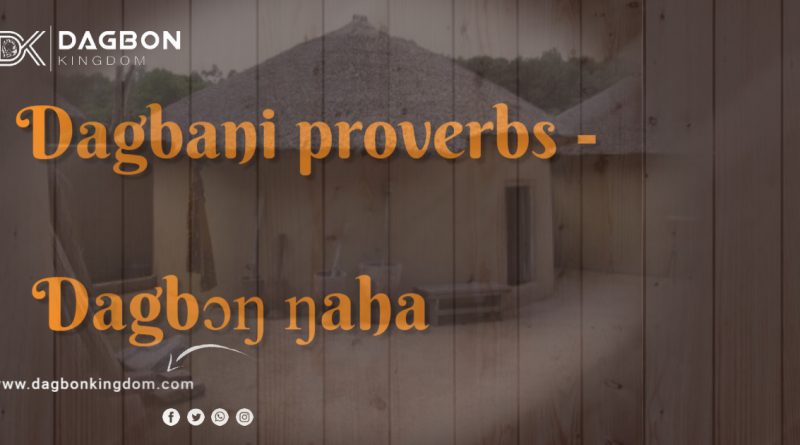
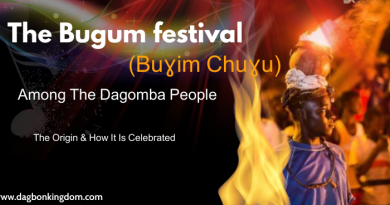
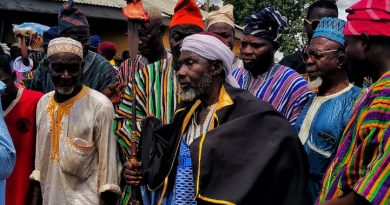
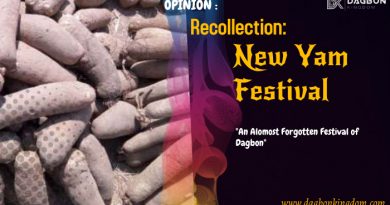
Zanduli ka chandi, Bagbani ka labiga.
This has been on my list for it’s history and context.
I have heard the 3rd part to it but can’t remember, albeit
“X ka ziyya” where x the 3rd town or location.
Thanks for your comments
Pingback: Dagbani idioms - Yɛltɔɣ'niɣima (Dagbɔŋ idioms) •
Pingback: Antonyms and Synonyms in Dagbani - Dagbaŋ bachilɛba mini Dagbɔŋ bachi liba •
Pingback: Dagbon oral literature •
Pingback: Slave Trade And Its Resistance In The Gbewaa States •
Pingback: Dagbanli Riddles - Riddles among the Dagomba people: •
Pingback: Aboriginal Dagombas : Before The Advent Of Yananima • Dagbon kingdom
Pingback: The advent of the lunsi in Dagbon State • Dagbon kingdom
Pingback: Naa Gungobili -The destitute Prince of Dagbon Kingdom • Dagbon kingdom